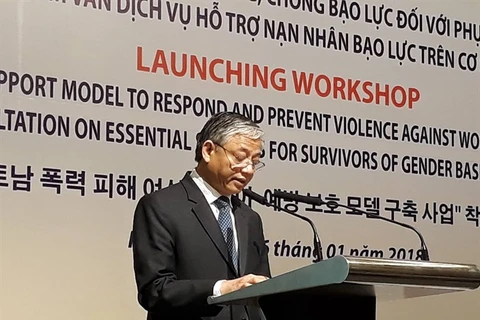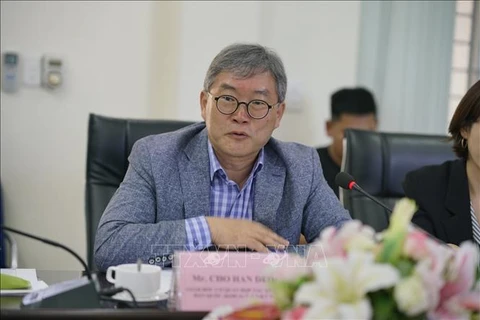 At the ceremony to launch "Anh Duong House" to support survivors of gender-based violence in Da Nang. (Photo: VNA)
At the ceremony to launch "Anh Duong House" to support survivors of gender-based violence in Da Nang. (Photo: VNA) Hanoi (VNA) - The Korea International Cooperation Agency (KOICA) and the United Nations Population Fund (UNFPA) have pledged to undertake the follow-up activities of building a model in response to violence against women and girls in Vietnam.
Country Director of KOICA Vietnam Cho Han Deog and UNFPA Representative for Vietnam Naomi Kitahara signed a grant arrangement in Hanoi on July 15, under which KOICA will provide financial support of 250,000 USD to UNFPA.
The grant aims to ensure the sustainability of the innovative One Stop Service Centre model, which is commonly known as “Anh Duong House” in Vietnam. The House was first established in April 2020 through the KOICA-funded project “Building a model to respond to violence against women and girls in Vietnam,” for the period of 2017 – 2021 with a total budget of 2.5 million USD.
The grant arrangement covers a bridge phase through 2023, when a new and larger project is expected to be launched. It looks to continue supporting Anh Duong House and its hotline for victims of violence, and to organise outreach communication activities and advocacy efforts to sustain and replicate the model in other locations.
UNFPA will work in partnership with the Ministry of Labour, Invalid and Social Affairs and Quang Ninh province to implement the activities to ensure the continuous provision of integrated essential services for survivors of gender-based violence.
Speaking at the signing ceremony, Cho Han Deog said during his recent visit to Anh Duong House in Quang Ninh, he observed how the House has effectively provided support and helped vulnerable women and girls.
He said: “KOICA has decided to continue supporting Anh Duong House in Quang Ninh as it has made significant contributions to the efforts made by the Vietnamese Government and by the local authorities of Quang Ninh to address gender-based violence and domestic violence. We want this model to be replicated in other locations. At KOICA, we embrace a zero-tolerance culture that says NO to any forms of gender-based violence.”
Anh Duong House became fully operational in April 2020, providing a wide range of services such as health care, psychological support, counselling, social welfare services, emergency shelters, police protection, legal and justice services, and referrals for many gender-based violence survivors, not only in Quang Ninh but also in 20 cities and provinces throughout the country.
Anh Duong House’s hotline service, which is available 24/7, has so far received more than 15,300 calls in two years. Most survivors of violence who have called the hotline are female (accounting for 93.6%), and most gender-based violence survivors are aged 16–59. Minors under the age of 16 account for 10% of calls. About 20% of calls came from Quang Ninh province and 80% from other provinces.
In addition, nearly 500 service providers from police, justice, health, and social work from both provincial and grassroots levels in Quang Ninh, received training for the provision of essential services for gender-based violence survivors. With technical support from UNFPA, Anh Duong House has been duplicated in Thanh Hoa, Ho Chi Minh City and Da Nang.
In her remarks at the signing event, Naomi Kitahara said UNFPA will make sure that the funds from KOICA will be used effectively. UNFPA will continue to work closely with Vietnamese partners to implement the bridge-phase activities of the project at the national level and in Quang Ninh province.
She added that zero-based violence and harmful practices is one of the three main pillars in the new UNFPA Strategic Plan for 2022-2025, and a clear priority for the UNFPA Vietnam’s new country programme 2022-2026.
“UNFPA will scale up efforts to end gender-based violence and harmful practices in Vietnam,” she said.
Gender-based violence is a manifestation of gender inequality which is deeply rooted in Vietnam. According to the 2019 national study on violence against women, nearly two in three women aged 15 – 64 experienced at least one form of physical, sexual, psychological and/or economic violence in their life time. Gender-based violence is very much hidden in society, when more than 90 percent did not seek any help from public services, and half of the women who experienced violence told no one about it. It is costing Vietnam 1.81 percent of GDP, which is significant./.
VNA





















